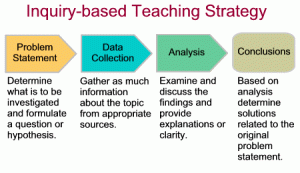What do I know?
I do not know a lot about inquiry learning other than it has questions at its heart for students to consider and research. I have not used inquiry learning with any of my Year 8 English classes.
Question marks coming out of a box. image question mark
What do I want to know?
How do I find what inquiry learning is? I am not currently using this learning process and my understanding of it is very limited. How do I choose which information is relevant and not relevant? My mission with inquiry learning is to not only understand what it is but eventually, how do I translate this to my own context?
How do I find out?
Initial Internet search for information on Inquiry learning:
On searching the Internet initially using Google and the words, ‘inquiry learning’ an overwhelming amount of information came up, in fact over eight million choices were given. Too many and how do I decide which ones are best?
Screen Shot of Google Search 1
Using Google and the words, ‘inquiry learning ‘ and ‘distance education’ to refine my search, there were still over two million choices. What arouses my interest is that there are some recommended scholarly articles. Could these hold something that is useful for me?

Screen Shot of Google Search 2
In the scholarly articles suggested at the top of the page, I found an article which described what a inquiry community looks like in the distance mode. Jackson (2013) quotes from Garrison et al. (1999) that, a successful online Community of Inquiry is one in which each student is engaged by set tasks (“cognitive presence”); feels challenged and supported by the teacher (“teaching presence”); and feels part of the community (“social presence”). This, at least, gives a basis to begin delving further into what do we do in this community but it is what competent distance educators should already be doing with their classes. Perhaps using distance education as a filter is not pertinent to my search as I really need to focus on inquiry learning and not muddle my searches with other contingencies.
As I scroll down I do find a link to a site, Work Sheet Library, which appears to have a comprehensive outline of what inquiry learning is about and succinct image depicting the process. It is a simple help sheet with enough information to provide an overview of inquiry learning.
 Work Sheet Library http://www.worksheetlibrary.com/teachingtips/inquiry.html
Work Sheet Library http://www.worksheetlibrary.com/teachingtips/inquiry.html
Moving further down, I locate a site which some information on inquiry learning. As I read through it I see a link to a document on inquiry learning in Alberta, Canada. This is what I have been looking for as the information here is extensive and relatively recent being 2004. I will be keeping this for further reference.
Focus on Inquiry: a teacher’s guide to implementing inquiry-based learning: p ix. https://education.alberta.ca/media/313361/focusoninquiry.pdf
Focus on Inquiry: a teacher’s guide to implementing inquiry-based learning: p 10. https://education.alberta.ca/media/313361/focusoninquiry.pdf
From this initial experience, I have located some information that should be useful in answering questions that I have. I now understand more about the concept of inquiry learning. Coming from a point of knowing little of the subject I now have some effective key words and filters to assist with my searches.
What do I want to know?
1) Are there inquiry frameworks for specific ages and/or subjects specifically English?
2) How do we work as a team, (TL, teacher, other) to recognise/identify critical learning from ACARA and then begin an inquiry process?
3) How do we ensure that we meet deadlines of curriculum while allowing students time for in-depth investigations?
The safari continues…
References:
Branch, J. Odberg, D. (2004). Focus on Inquiry: a teacher’s guide to implementing inquiry-based learning. Alberta Learning Teaching and Resources Branch. Alberta, Canada. Retrieved on 18th August, 2014 from https://education.alberta.ca/media/313361/focusoninquiry.pdf
Jackson, L. C. (2013). Establishing an online community of inquiry at the Distance Education Centre Victoria . Masters by Coursework & Shorter thesis, Melbourne Graduate School of Education, The University of Melbourne.
Clarke, Jody. (2009). Exploring the complexity of inquiry learning in an open-ended problem space. Harvard University Cambridge, MA, USA.
Image definition of inquiry learning and Reflecting on the Process. Retrieved 27 July, 2014 from https://education.alberta.ca/media/313361/focusoninquiry.pdf
Safari image. Retrieved 27 July, 2014 from image safari.
Work Sheet Library. (2007) Inquiry-based Learning. Retrieved on 18th August, 2014 from http://www.worksheetlibrary.com/teachingtips/inquiry.html






Hi Catherine! Your blog looks great! I feel the same as you – I know a bit about what inquiry learning is in theory, but I’ve never used it myself. Like you, I really want to work out how I could use it in my own context as an ESL teacher (and previously a secondary Japanese, English and SOSE teacher). I’m also interested in how it could be used in English teaching.
You said you wanted feedback on referencing. I think you should include a full APA reference for the 2 websites. Have a look at the uni’s CiteWrite for guidance on referencing websites, as well as consistency of APA formatting (eg. initials for authors’ first names, location before publisher). I’d probably also include hyperlinks to the other 2 references since you found them online, or at least some indication of what kind of resources they are (theses?). I’m not sure if we need to put captions on screenshots, but I probably would because it’s hard to read see them clearly. Can you make them a bit bigger? I’d probably caption the other images with more than just a hyperlink.
I hope that helps. Good luck with the rest of your blog!
Hi Robyn,
Thanks so much for your comments. They are really helpful. It has been awhile since I have done referencing and as you can see I am more than a little rusty.
Pingback: Table of Contents | cocon11